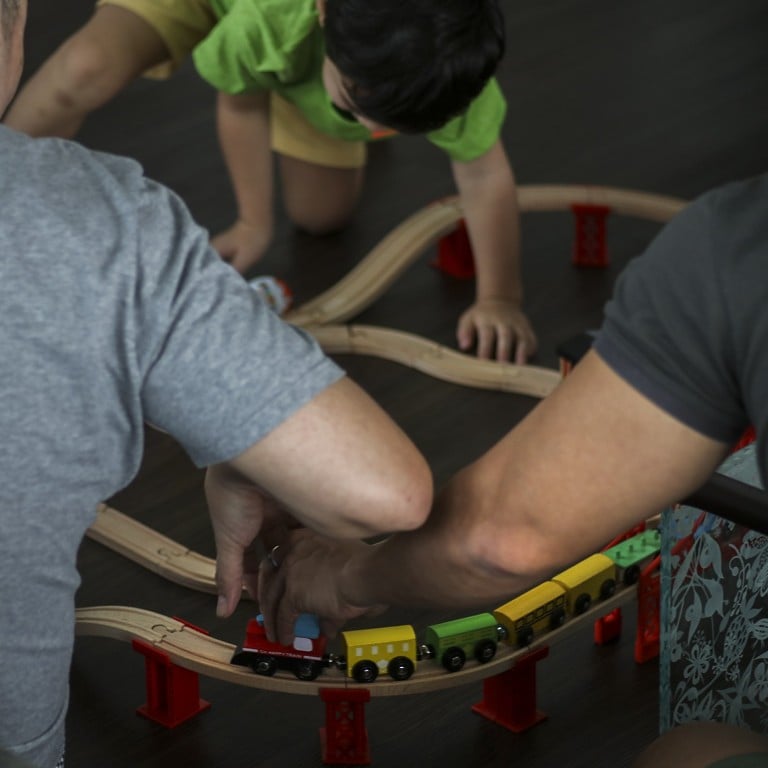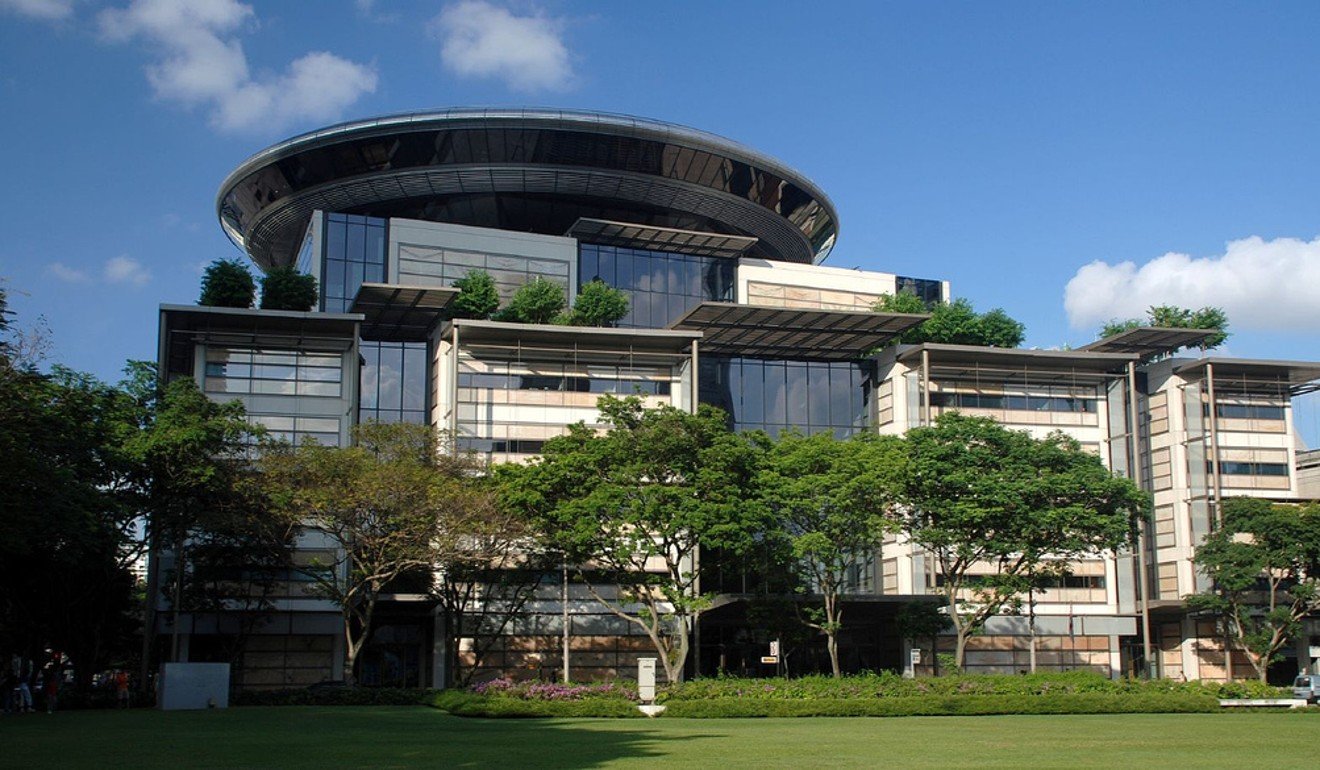
Singapore allows gay couple to adopt their surrogate son in landmark ruling
- The two men are Singaporeans of Chinese ethnicity, aged 45. They began dating in 1998 and have lived together since 2005
- The process was treated as single-parent adoption and will confer to one of the men sole parental rights and responsibility for the child
Singapore’s High Court has made a landmark ruling allowing a gay couple to adopt their five-year-old son conceived through a surrogate in the United States, on the basis of prioritising the child’s welfare.
In a 145-judgment released on Monday, a panel of three judges led by Chief Justice Sundaresh Menon ruled the adoption bid, rejected by a lower court last year, should go through because it would “increase the child’s prospects of acquiring Singapore citizenship and securing long-term residence in Singapore”.

Singapore has a law banning gay sex and the government has said any change to legislation will need to take into account public opinion, which is deeply divided over the issue.
The judgment noted the court considered Singapore’s public policy on same-sex families and its relation to this case as well as any policy violation if an adoption order was made. Yet neither reason was “sufficiently powerful to enable us to ignore the statutory imperative to promote the welfare of the child and, indeed, to regard his welfare as first and paramount”, the judgment said.
The judges also stressed their decision was not an endorsement of the couple’s actions or a result of “sympathies for the position of either party”.
Where to go, what to do? Family in Singapore’s gay surrogacy adoption case face life in limbo
But the court’s decision is essentially Singapore’s first legal acknowledgement of same-sex families.
The couple, “James” and “Shawn”, first applied for James to adopt their son “Noel” in December 2014 when he was about a year old. Their real names have not been disclosed.
Noel was born in the United States to a surrogate mother after an assisted reproduction process that used James’ sperm. The child is an American citizen and has been living in Singapore on a dependent’s pass, which has to be renewed every six months by leaving the country.
[We] really want Singapore to be the home of our family. Our family will celebrate this significant milestone
With the judgment, James can now adopt Noel as a single parent, giving him sole rights and responsibility over the boy, including applying for Singapore citizenship for him.
The couple, who were at work when they heard the news at 10.25am through their lawyers, were elated.
“It was business as usual because we didn’t want to get our hopes too high,” said James, who is a doctor.
Shawn works in the marketing industry. Both men are 45, of Chinese ethnicity, and are Singaporeans. The men have been in a relationship since 1998 and living together since 2005.
James said the family was happy and relieved that Noel could be adopted.
“The fight to raise our family in Singapore has been a long and difficult journey,” he said. “We hope that the adoption will increase the chances of our son to be able to stay in Singapore with his family. “His grandparents and us really want Singapore to be the home of our family. Our family will celebrate this significant milestone.”
The couple then appealed the decision in the High Court.
China looks at making surrogate motherhood legal
James’s lawyer Ivan Cheong, partner at Eversheds Harry Elias, said the case was important because it showed how the Court would take in public policy considerations.
“In the current case, notwithstanding that the court found that there is a public policy in favour of parenthood within the marriage and a policy against the formation of same sex units, the court found that the welfare of the child would be significantly promoted if an adoption order was made,” Cheong said. “At the end of the day, it is about what is in the child’s best interests.”
Surrogacy in Hong Kong: all you need to know about the risks and legal ramifications
The case has also provided clarity on surrogacy issues in Singapore, he said. The court found there was no public policy against planned or deliberate parenthood by singles through the use of assisted reproductive technology or surrogacy.
Koh Tien Hua, partner at Eversheds Harry Elias, who was also James’s lawyer, said this was the first time surrogacy and gay adoption was canvassed in court. The outcome showed that “family is important no matter the orientation of the parent and family is the cradle of society”.
Booming surrogacy business is a legal grey area
In his judgment, Chief Justice Menon outlined how the considerations related to fundamental values in Singapore society.
“The law is asked to provide the answer to a dilemma that challenges the mores of a largely conservative society,” he wrote, saying the court’s approach was to apply the law and not determine social policy in Singapore.
The Attorney-General’s Chambers, representing the guardian-in-adoption, argued that allowing the adoption would contravene three public policies: for parenthood within marriage, and against planned parenthood by singles through assisted reproductive technology, and same sex family units.
The court, however, did not think there was a clear public policy against surrogacy and said the government’s position was still evolving.
The Singapore courts have in the decision taken a further step away from the perception of the traditional family as the accepted model
The court agreed there is strong evidence for public policy in favour of parenthood within marriage, but thought an adoption order in this case does not contradict public policy. Menon reasoned that the law allows single parent adoption without stating they must be married or have a partner of the opposite sex.
“A public policy in favour of parenthood within marriage is not the same thing as a public policy against other forms of parenthood,” he wrote.
The Chief Justice agreed there is a public policy against the formation of same-sex family units, saying the government tries to strike a balance by recognising homosexuals as part of society and to accept them, but not to advance their causes.
Law professor Leong Wai Kum said she agreed with the decision because “it seems clearly wrong not to allow a father to adopt his own biological child”.
Family lawyer Sim Bock Eng thought this decision, although governed by what is in the best interests and welfare of the child, endorses surrogacy and homosexual parenting.
Singapore DJ files court challenge against colonial-era gay sex ban
“The outcome is that the absence of a traditional family unit is not seen as being to the detriment of the welfare of the child. Whilst single parent adoption was not unusual in the past, the Singapore courts have in the decision taken a further step away from the perception of the traditional family as the accepted model,” she said.
But lawyer Eugene Thuraisingam, cautioned against reading too much into the decision. “It merely reiterates the point that the court will always prioritise and give effect to what is in the child’s interests. I do not see it as any ruling on policy by the courts.”

